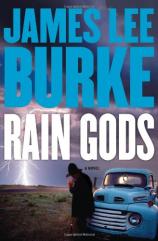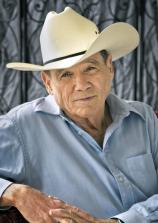Rain Gods
Review
Rain Gods
It is a regrettable likelihood that at this stage in his career,
James Lee Burke has fewer books left to write than he has already
written. A lesser author in Burke’s station might be phoning
in his next novel, retreading old situations in new or gently used
clothes for a loyal and understanding gallery. That is not true,
however, of RAIN GODS, his latest offering. There is no weary or
threadbare prose here; the plain and simple truth is that readers
will find some of the best and most memorable prose of
Burke’s career, as has been the case with each of his new
books for as long as I can remember. This would be an astounding
accomplishment for any author; it is more so for Burke, when one
considers the length and breadth of his bibliography, stretching
back to well over a third of a century.
The primary surprise in RAIN GODS is the return of Hackberry
Holland, last featured in LAY DOWN MY SWORD AND SHIELD, a
stand-alone work of Burke’s that predated the publication of
the first Dave Robicheaux novel by some 16 years. Holland was an
attorney in 1971; in RAIN GODS, he is a 70-something sheriff whose
jurisdiction includes a lonely Texas crossroads that, as it turns
out, is the situs of a horrific massacre of innocents. An upright
Holland (though it physically pains him to be so) is experiencing a
successful recovery from alcoholism, yet he is haunted by misdeeds,
both committed by and directed toward him. The discovery of the
burial site of nine women, some of them barely out of childhood,
reopens old wounds for Holland and creates new ones, both literally
and figuratively.
Holland initiates an investigation that catches him between a
Federal agent on a personal mission of vengeance; ICE (Immigration
and Customs Enforcement), which is after a notorious Russian
mobster; and an enigmatic hit man. The latter is a homicidal force
of nature known as Preacher. It is Preacher, ultimately, who makes
RAIN GODS one of Burke’s most memorable works. A thoroughly
unsympathetic character, Preacher is nonetheless riveting due to
his unpredictable nature, which is capable of inspiring him to mete
out savage death or touching charity, and is ruled by a frightening
capriciousness. One of the book’s marvels is Burke’s
ability to give voice to Preacher’s thought processes,
infusing his conclusions and actions with a terrifying illogic that
gives a new definition to randomness.
Several others are caught in the crosshairs with Holland ---
some by choice, some intentionally, some with innocence, and some
with guilt. Among these are a scarred Iraqi war veteran and his
girlfriend, a waitress possessed with a gift of song and cursed
with a loyalty to her man, which may well get her killed; a
restaurant owner who also secretly owns a string of strip palaces
and whose chance remark sparks a violent, senseless act and a
string of subsequent deaths; and Holland’s female deputy, who
is decades younger than him and seeks to awake passions in him that
he feels are dead, or at least improper with a woman of her age and
station.
The themes that Burke visits here are familiar, well-trodden
ones. Chief among them is an individual’s capacity for good
or for evil, sometimes revealed within the occurrence of a single
action. The power of women over men is another; it is women who
spark the catalysts that take place in RAIN GODS and who
ultimately, if indirectly, bring an end to them, though it is men
who provide the instrumentality. Burke, notwithstanding the
familiarity of these storylines, continues to find variations from
which to work new and wondrous tales. Holland is an extremely
realistic senior sheriff, a man who in some ways is too old to do
his job and yet still does it because he must. On those rare
occasions when he uses his service firearm, Holland for the most
part misses his target, succeeding only and possibly with enigmatic
results at best. He is the toughest of tough guys in the sense that
he can take a beating, as he demonstrates, though the days when he
could administer one appear to be long gone.
It is the narrative, however, that is the biggest strength of
this character-driven novel. Burke is at heart a poet capable of
describing the light and the dark in equal measures of the
beautiful and horrific, one who can both gradually illuminate the
darkness and cast dark shadows across the sun, often within the
space of a single short paragraph. RAIN GODS is a work of deep,
violent and, yes, beautiful magic, a wondrous manifestation of one
of our best American authors becoming even better, as improbable
and impossible as that may seem.
Reviewed by Joe Hartlaub on January 23, 2011





